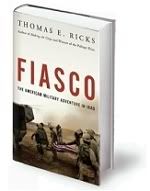by Cmdr. Jeff Huber
crossposted at ePluribus Media and DailyKos.
 Every American needs to read Fiasco The American Military Adventure in Iraq by Thomas E. Ricks.
Every American needs to read Fiasco The American Military Adventure in Iraq by Thomas E. Ricks.
The New York Times called Fiasco “…absolutely essential reading for anyone interested in understanding how the United States came to go to war in Iraq, how a bungled occupation fed a ballooning insurgency and how these events will affect the future of the American military.”
I’ll do the Times one better. Fiasco may be the single most important book on armed conflict since the History of the Peloponnesian War, written by the Greek general Thucydides around 400 BC. Much as Thucydides chronicled the decades long war between Athens and Sparta that led to the downfall of the Hellenic world, Ricks describes in compelling detail how the neoconservatives risked America’s position of power on a roll of the dice in Iraq, and lost.
Pulitzer Prize winner Tom Ricks has spent over twenty years on the Pentagon beat for the Wall Street Journal and the Washington Post. Long known for his frank but even-handed reporting of American military affairs, Ricks pulls no punches in his scathing analysis of the run-up to the Iraq War, the conduct of the "major combat" phase, and the lamentable end-zone fumbles that occurred as the counter-occupation insurgency emerged.
Much of what Ricks reveals is familiar to those who have been following the Iraq War saga. Fiasco‘s cast of characters includes well-known names: Dick Cheney, Richard Perle, Donald Rumsfeld, Paul Wolfowitz, John Bolton, Tommy Franks, Colin Powell and many, many more. But Ricks also gives us a comprehensive granularity on the Iraq War far beyond anything else available in the literature on the conflict. He read thousands of documents and conducted hundreds of interviews in the process of researching this book. And unlike some other books written about Operation Iraqi Freedom, Ricks’ perspective isn’t a partisan spin of the pertinent events surrounding the conflict. His analysis of the Iraq conflict, though brutal, is laudably objective.
Ricks is also one of America’s premier authorities on the scholarship of the art of war. In plain language and non-academic terms, he illustrates how the high-level civilian and uniformed military leadership failed to heed war college 101-level lessons on armed conflict. By focusing on high-tech, "transformational" means of tactical victory, Rumsfeld and his hand-picked four-star coterie failed to understand how to turn "success in combat" into achievement of strategic objectives.
Thomas E. Ricks is a veritable national treasure. His unique knowledge of military affairs, contacts within the Pentagon, easy-to-read prose style and journalistic integrity are unsurpassed by any other American military writer today. After you finish Fiasco, check out his earlier books Making the Corps and A Soldier’s Duty.
Also look for his stories in the Washington Post. As America seeks to maintain a leadership role in the post-Iraq, post neoconservative era, no analytical voice will be more accurate or reliable than that of Thomas E. Ricks.

About the author: Commander Jeff Huber, U.S. Navy (Retired) writes from Virginia Beach, Virginia. Read his commentaries at ePluribus Media and Pen and Sword.
ePluribus Contributors and fact checkers include: wanderindiana, Vivian, cho and roxy
If you like what ePMedia’s been doing with research, reviews and interviews, please consider donating to help with our efforts.




As the daughter of a career Army officer (RIP) who was a serious student and teacher of military history, your review of Fiasco is a substitute for his endorsement.
I also appreciate your reminder that his regular writings are available via the Washington Post.
One question though as I have not yet read Fiasco…
But does Ricks answer the why?
As always, Jeff, thanks for your insight. Excellent review, too.
Mad ‘props to ePluribus Media for their continuing excellence!
Interesting rah rah blurb Jeff, although I am more interested in a review of the book (i.e. what are the key premises, where does the timeline start, who did he interview – soldiers, admin officials, pentagon, etc., does it merely reiterate his writings in the WaPo, or does it provide new info, etc.) to determine if it provides any additional information that has not been published elsewhere about how the neocons sold the war and then conducted it? Or does it consolidate all other works/ references into a neat package?
(As an aside, it is in bad form to recommend your own diary, regardless if it’s under the auspices of a group)
I’ve got to agree, this reads like a press release.
…I wouldn’t have bothered to review the book.
As a retired military officer, war college graduate, and a writer on military and foreign affairs, I think–more than ever–it’s important for all Americans to familiarize themselves with both areas, and Ricks’s book is one heck of a fine way to do that.
I have a passing relationship with Ricks–we’ve corresponded on military matters from time to time over the last decade. But I expect to recieve no favors from him in return for promiting his book, and made not one red cent for writing this.
I don’t do book reports. If you want to see what’s in the book–and you should–read the book. If you don’t like the way I reviewed the book, fine. Read the book anyway.
Best,
Jeff
I saw a long and detailed interview with the author on Tim Russerts cable show, msnbc, and this guy is very knowledgeable about the Iraq fiasco, plus on the show at least he gives some very good possible strategies for getting us out of their. In fact I was most impressed at how he laid out the story and how articulate he was with an indepth knowledge quite stunning.
Anyway I add my rec. to this book and thanks for bringing it up here.
Good post. My copy just arrived this very day from Amazon.